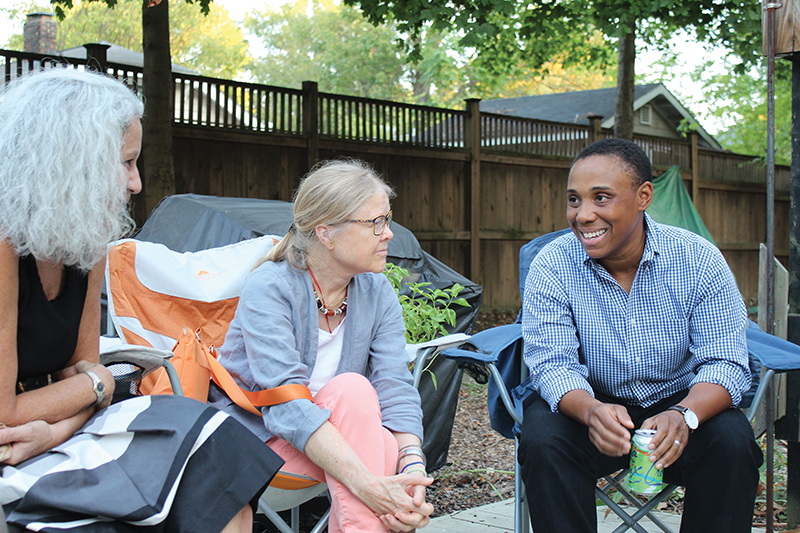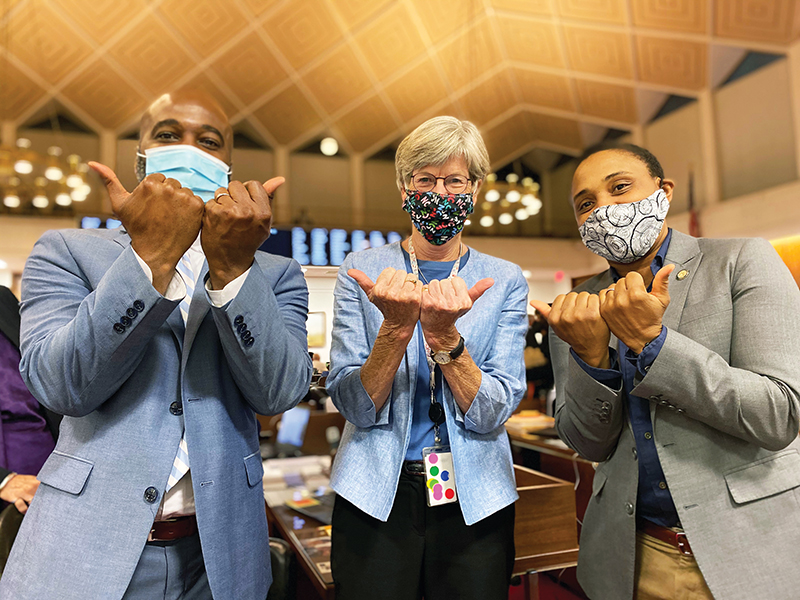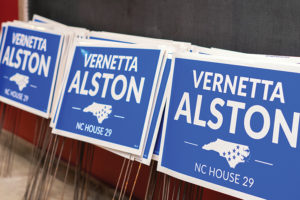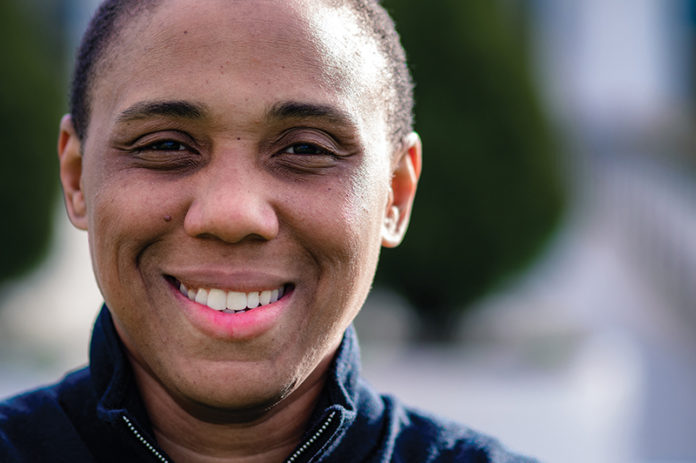The league’s quarterly legislator Q&A.
If we’ll be talking about 2020 for the rest of our lives, 2021 is sure to be part of the conversation. The hope: this is the year we make it out of the woods, even as the pandemic continues to post grave numbers. As a state lawmaker, Rep. Vernetta Alston of Durham knows, a lot rides on an effective legislative session, ideally one with positive interaction between federal, state, and local decision makers and between the political parties. Bringing experience as a past member of the nonpartisan Durham City Council, Alston, who lives in the city with her wife and two children and was appointed to her House seat in 2020, knows we can write uplifting chapters together. Southern City recently paid her a visit to learn more of her perspective.
˘˘˘
What do you see happening in the 2021 legislative long session?
VA: Hopefully, some of the lessons that we’ve learned, not only over this last year or so, but in the past many years, is we’ll get a lot farther together when we listen and compromise, look beyond ourselves for the best of people in North Carolina. I hope there’s more of that in this coming long session. When we had the ceremonial opening day (in January), there was some hopeful talk about coming together, working together, and I’m hoping that that won’t be too hard to do. I’m certainly coming in here first and foremost with the goal of representing my constituents’ goals, so to build relationships with everyone here, and hopefully do the most good work for the most people while serving. That’s kind of the theme, at least for me.
In terms of substantive issues, there are a lot of things I care about. I came most recently from serving on the Durham City Council and care about a lot of things that are affecting our municipalities. Especially in this last year, with COVID and just the provision of basic services and the additional crisis of … infrastructure issues. I’m thinking about that, I’m thinking about transportation, and where transportation intersects with energy and sustainability. … And also, more broadly, with municipalities, talking with some of your colleagues in the short session just in trying to fight for them to have the resources they need to respond to the pandemic. … And that leads me to think, substantively, COVID is going to be at the forefront of our minds and it’s going to be a huge task, regardless of how much cooperation or funding we get from the federal government, which hopefully will be substantial. Regardless of which I think we have a lot of work to do to help people try and maintain and not fall deeper into personal crisis and hopefully thrive and be healthy. That’s huge. … I’m hopeful there’s some creative ways we can think about the housing crisis and there’s I think broader interest in the topic than what we’ve seen in the past nine, 10, 11 months, and the impact on housing stability and the public health concerns that can come with housing instability.
You have a lot on your plate. You received a leadership role, didn’t you?
VA: Yes, Rep. Terry Brown and I are serving as co-chairs of the House Democratic Freshman Caucus. We’re a group of now eight new legislators and we just got organized and started meeting, and definitely look forward to working with that group. I only hope that Representative Brown and I can kind of hopefully shepherd us into a direction that hopefully adds value to the whole caucus over this next biennium.
We keep track of who has municipal experience in the legislature, where people come from all kinds of experience backgrounds. But municipal government, just having that level of government experience, is so valuable. How do you think it helps you as a legislator to have had that background with the Durham City Council?
VA: Oh, in so many ways, some of which probably haven’t revealed themselves. I was appointed to this seat in April of last year, just in the belly of the official shutdowns of the pandemic. In late March, I was in a city council meeting speculating about how hard-hit our budget was going to be, how many spaces to put on buses between passengers—the nuts and bolts of municipal governance. And the next week, I was here. Even in that moment I felt such a fire to fight for folks at the local level—now, the tools we have are limited, the funding is limited, but that experience immediately made me want to be a strong advocate for municipalities and all our county governments …
We talk about housing, utility moratoriums, and all those things—and I think having that frontline perspective framed how I approached our policy making around the pandemic, but also in understanding … I’m not an expert in much of anything, and I think we all have to be pretty nimble in the topics and subject matter we’re asked to think about. And it’s hard; hard to keep it all together. And I think having municipal experience and time where I was asked to think more specifically about pieces of our local infrastructure and interact with a very unique way with our constituents … helped me understand the accountability that I have to the folks I represent but also just a greater understanding of at least some pieces of our infrastructure and how they work, how they’re funding, who the stakeholders are, what the real-world impacts are on people’s everyday lives. That’s where we are. Hopefully that experience will continue to pay off.
 Why did you enter public service to begin with?
Why did you enter public service to begin with?
VA: I’m a lawyer by training. And prior to serving on the city council, in 2017, I did death penalty defense work. I say that to say my kind of mission, at least professionally, has been to do work that feels purposeful, that is kind of centered around service or serving the community that wants and needs an advocate—and so that has always been a foundation of my work. I hadn’t planned to run for office. That idea kind of came to me. And I thought to myself, this could be a really unique opportunity to serve in a different way. I didn’t want to lose that thread. It felt like I could take that same core mission that I have for myself and apply it to a much broader kind of scope, with different types of people across different issues. But I hadn’t had a lifelong dream of serving in public office. This path has been a welcome surprise.
With criminal defense and death penalty work, is there a single event or story that pointed you in that direction?
VA: I think yes and no. On the one hand, there ended up being so many reasons, so many things that drove me to continue in that work. There are so many issues that I believe with the system that impact other parts of our criminal justice system too that motivated me to be an advocate in that space. Initially, when I first got out of law school, I worked on the Racial Justice Act studies. The act was commissioned in 2009, and myself and a fleet of other new lawyers who had just graduated from law school in the middle of a recession got hired to pore through old court transcripts, to drive around to county courthouses in every corner of the state to pull files and make copies and read them and collect data that would support the RJA. I hadn’t previously thought about death penalty work. I thought I was going to go into children’s rights work. But once I was here, I thought, this is where I am, I’m going to invest in what I’m doing. I learned a lot, I read a lot of books and just learned about the death penalty, and the process of working on the RJA, that experience made me feel like that issue was incredibly urgent and that our work was urgent, and that people are being harmed by this aspect of our system, and we have an opportunity to change it. And so, I think working on the Racial Justice Act in particular was a really transformative experience for me professionally.
You mentioned it feeling urgent. If I recall, it was urgent in another way too because the RJA was controversial, with some efforts to repeal it. Reaching across the aisle, and with that being a theme right now, of unity, how do you think that’s achieved, especially with some of these issues where you do see party lines being drawn?
VA: One part of the answer is, to me, I’m still learning. I’m still incredibly new to this building and to this group of people, and particularly with COVID it’s been difficult to build relationships and sit down with people, and so I’m still very much learning how to do that. I expect that, for me, approaching people and situations and the relationships that we’re forced into, coming into this with some humility, listening like I said before. And this is something I learned on council—coming from a place of knowing that I may not be right, I don’t have all the answers, and trying to build relationships with that, kind of with that framework, is something I personally try to do. I expect that to be useful. Time will tell.
But also, when I was doing death penalty defense work, I spent a lot of time talking to the public about the death penalty, and I had a lot of cases in eastern North Carolina, which is different from Durham in a lot of respects, and talked to a lot of folks who had different perspectives on the death penalty than I did. And something that I know folks who are more experienced than I am do, and that I try to do myself, is approach a situation with humility first and foremost, listen to what they have to say, but try to relate to them. It’s a common idea; the more you can make something relevant to somebody’s life and something that they care about, the more apt they are to listen.
A lot of my personal heroes approach it with that epistemology approach—what we know is not more important than how we know what we know—and so in listening to each others’ stories and trying to empathize with things we may not have a personal tie to, we can talk about it and maybe that’ll affect how I approach this certain issue that I didn’t understand before. Do you have any personal heroes who affect how you model your approaches and service?
VA: There are folks who I seek mentorship from and whose approach to public service and politics I do draw a lot from. My predecessor in this role, MaryAnn Black, was certainly one of them. And I know of colleagues who feel the same way. She was just always able to maintain a perspective on her role and just often the noise of politics that I appreciated. She was very just genuine and realistic and just didn’t get caught up in the noise, as I like to think about it. I always really respected that about her and appreciated how accessible she was because of that. My colleagues in my delegation are folks that I take a lot of cues off of. Mayor (Steve) Schewel in Durham is someone whose temperament and preparation and style is something that I really appreciate. I think he is, to me, someone who is always thorough, always direct, incredibly researched, and incredibly kind and diplomatic. I want to hope that I’ll recall a lot of what I saw and heard from him while we served together in Durham.
Outside of politics, you have a life to yourself. It’s a part-time legislature but really a full-time job. How do you break away and find time to think and do things you enjoy?
VA: Well, we have two small children. So, the time I have to do that is very slight. But when I do, I try to exercise and try to do that regularly, mostly in my garage, so that’s an important time for me. I run, not well or fast, but that is also time where I can kind of achieve some quiet that I need in my daily life, to recenter and focus and do something I can enjoy. Those are the tools I have now, with the limitations that are still part of our lives. And other than that, it’s the circus of having two small children (laughter).
 That’s important. That ability for someone to serve amid the financial or time challenges of life in general. What conversation did you have with yourself to say, ‘I know I can make this work, but I have to remember the things I need to pay attention to in my personal life’?
That’s important. That ability for someone to serve amid the financial or time challenges of life in general. What conversation did you have with yourself to say, ‘I know I can make this work, but I have to remember the things I need to pay attention to in my personal life’?
VA: It was mostly a conversation with my wife. When I ran for city council in 2017, our daughter was a newborn … and I think we learned a lot together, the hard way, about how all-consuming this work and campaigning for these types of jobs can be. Our communication is really strong, and so we just set some boundaries and talked about things that are non-negotiables and it’s always important for me to make sure we have buy-in from her and give her as much information about what the expectations are going to be up front as I can. … Beyond that, just trying to be super vigilant about working together as best we can. And setting boundaries. When we have to work, we have to work. But, particularly when I was on council and certainly once these COVID restrictions on life, there’s always somewhere you can be, there’s always something you can be doing, there’s always a breakfast, a mixer, a reception, a panel—there’s always something.
And so that conversation I had with myself was: What things do I feel like I have to be at, want to be at, or really aren’t more important than spending time with my family. Managing those things helped a lot.

With the want that you have to be here and service, certainly on the freshman end of things, it kind of makes legislative service a frontier. There’s a lot you can do in the future. What kind of mark do you hope to make while you’re here?
VA: I want to make a memorable one. I want our delegation to make a memorable one. I think Durham is a really special place. I think we have a lot of passionate people who, to me, care about a lot of the right things. A lot about taking care of each other and making sure people’s basic needs are met, and I hope I can bring some of that here in a sustainable way. From my chair and my caucus’s chair, that feels harder to accomplish than we had hoped before the election, but I still hope even in this biennium we make some good progress toward the things that folks in my district and county care a lot about. I hope I make my mark as a capable legislator who’s easy to work with and who cares about—I think the front page super juicy issues we hear and want to talk about a lot—but also the less titillating things, like bike lanes. I want to be known for making an impact in both of those types of areas—I think (laughter).














